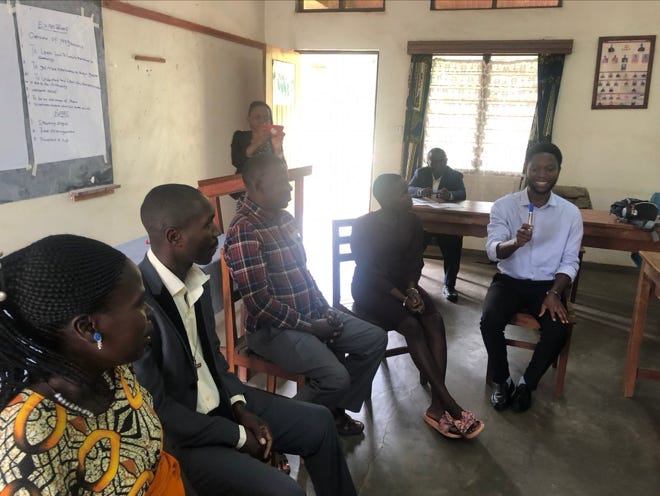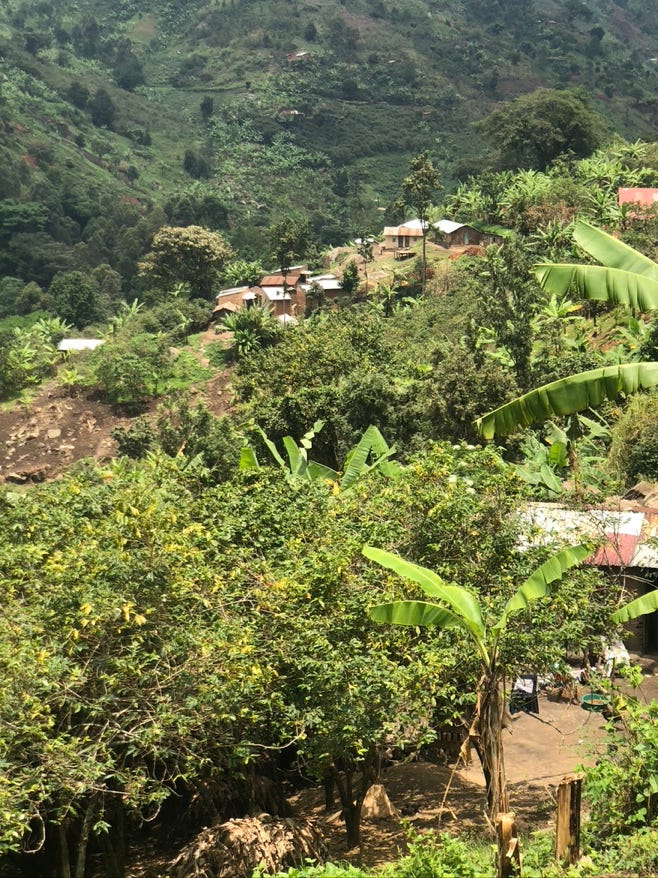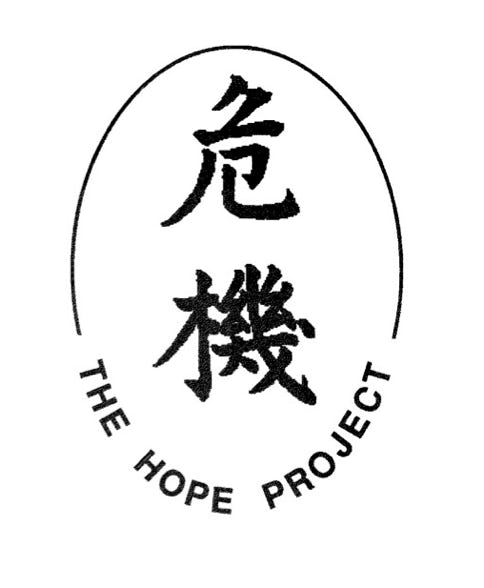Visit by John Lampen in August
After 2019, I did not expect to visit Uganda again. But earlier this year we received a surprise gift in the form of a large legacy. Our funds were in good shape already, so it offered an opportunity to do something different, either by funding a new project or extending the pro-gramme of an existing partner. Diana and I decided that the most responsible way forward would be for me to make a visit and assess possibilities, without telling people that I had funds to distribute; I also held discussions with two former MPs who are close friends. On return we discussed what best to do with two experienced friends who had visited the projects. We explain our decision below.
Our partners have gone through hard times lately. Most of their work is done with groups of people; and for twenty months no community groups or school classes could come together as the country locked down to prevent (very successfully) the spread of covid-19. But the closing of secondary schools has damaged the prospects of students, and many are running catch-up classes for senior pupils through the August holidays. I was also told of increased domestic violence and youth problems during the lockdown. The previous drought has eased. But climate change affects the ice caps of the Rwenzori mountains, and the rivers fed by them have had devastating floods; huge boulders carried by the water have destroyed buildings and food gardens.
Our main partners:
Rwenzori Peace Bridge of Reconciliation (RPBR)
RPBR has suffered a drastic reduction in funding. John was disturbed to learn that our own grants last year (to buy a new vehicle and run their pre-election programme) comprised their largest income. The rest came mostly from member group subscriptions, which fell away as they could not work with them during lockdown. The 2021 income was only a quarter of what they received in 2020, so they lost staff and programmes. Most of their school peace clubs disappeared, and consequently school strikes are increasing. The retirement of the founder and Director, Nelson, has reduced RPBR’s public profile, as he was very well-known; but his successor Noerine has brought a new vision and energy to the work. Noerine, whom we have known since childhood, is Nelson’s daughter and benefits greatly from his support, but John doesn’t suspect nepotism; indeed Nelson didn’t want her to apply for the job!
John visited RPBR’s second centre in Rwesande, and took part in a training event. In the main office in Kasese Town he met Noerine and the Board and was convinced they could carry the work of peace in the District forward, building on their past experience and reputation, if only they were given the means to put their ideas into practice. They had organised well for their 2021 pre-election programme, and ran a successful Youth Caravan which visited several village centres last November. During John’s stay they mounted a seminar on domestic violence for their members in which he took part, and it convinced him of the need, as much as ever, for their contribution.
So after the discussion with our knowledgeable friends at home we decided to offer them a grant of £4000 for next year, provided they can write for us a convincing programme of new work and related costs which falls within this budget. If it goes well, there would be an equal grant for the following year. (We will hold in reserve the remaining £2000 of the legacy, probably for a smaller grant in 2025, so the loss of income then is not too severe). We wondered if we were propping up an organisation which was bound to come to an end before long; but we decided the work is valuable and needed and they are capable of doing it. Besides, during the next three years other sources of funding may become available.
Ibanda Literacy Schools (ILS)
Our schools are in good shape. John ascended 1450 feet on foot from Kibirizi, our Adult Education Centre to visit Mirimbo and Kiharara campuses. As it was holiday time, the nursery classes were not running, but he met the tailoring course at the Adult Education Centre; they made him a nice shirt and Aziidah a dress during our two-hour discussion with the former head teacher Lucy, now chair of the Board, the new head teacher Chance, the accountant, and Bahati Muhesi, a very old friend and a teacher who acts as inspector and advisor for us in John’s absence. Zelina the co-ordinator was away at university—where we support her as part of our staff training. John checked the salary records, now kept on computer and very easy to understand. The staff also appreciate a new savings scheme created for them. The demand for basic literacy and numeracy is reducing so they plan to offer short courses instead of continuous classes.
Kibirizi is built of brick, and during lockdown the teachers, whom we kept on full pay, had maintained the buildings and demonstration garden. We discussed the state of buildings in the other campuses, and decided to make a grant to each one. (At Kiharara each pupil’s family is giving 100 self-made bricks to replace a mud-and-sticks classroom, so they can use theirs to buy cement.) We will also pay out of our Projects Fund for them to put on a refresher training on “learning through play” for all the teachers, and to get Kibirizi workshops a first aid box.
SanPads Programme
Two friends from our Quaker Meeting, Julia Furminger and Judith Parkin, initiated this programme to teach women how to make their own reusable sanitary pads in 2019, and returned in 2020 and gain in 2024 to train trainers. (Julia also visited Kenya on both trips to introduce them there). This meets a great need, as many girls miss school during their periods. We produced manuals in English, Lukhonzo (the local language in Kasese) and Swahili, and paid for these to be printed. John took parcels of waterproof material – needed for one layer of the pads and hard to get locally – to five projects which are still actively training, including one for disabled women. He was happy to see the programme continuing in these centres.
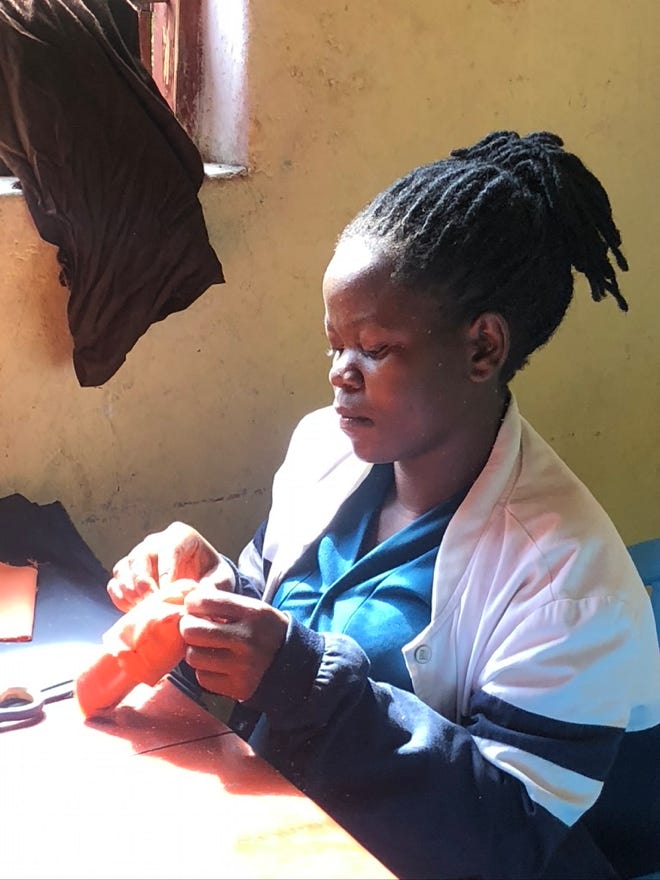
FINANCE: Please note that the Hope Project no longer has its own bank account, and all money is handled by Stourbridge Quaker Meeting, which is a branch of Central England Area Quaker Meeting Charities, registered charity nº 224571. If you would like to support the work of our partners please contact us at lampen@hopeproject.co.uk
The Hope Project has worked mostly with two partners in Kasese District, Uganda. Rwenzori Peace Bridge of Reconciliation is a district-wide network of community and school organisations committed to peace. Ibanda Literacy Schools is a group of six community schools and an Adult Education Centre in the Rwenzori mountains providing adult literacy and vocational training, and nursery education. John was a founder-member of both organisations. We send them money mostly donated by our friends and some Quaker Meetings for which we and they are very grateful. From time to time we also give money to a few smaller organisations known to us personally.
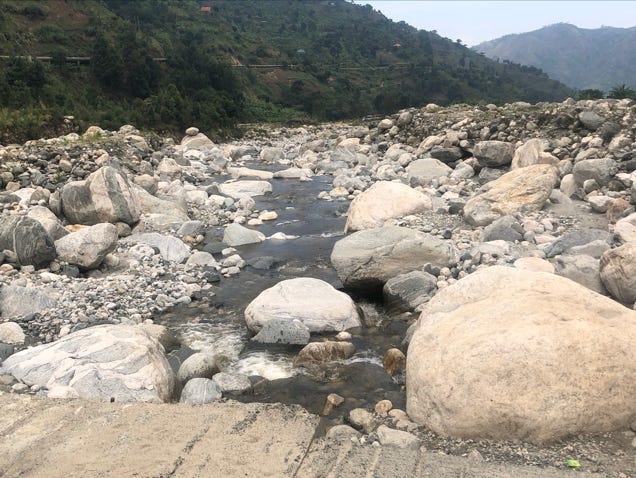
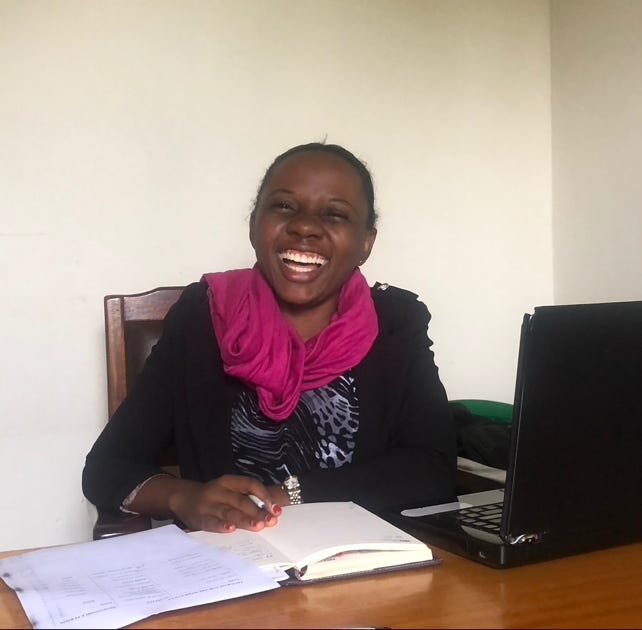
Above: Muhindo Noerine, the new Director
Below: Training exercise
